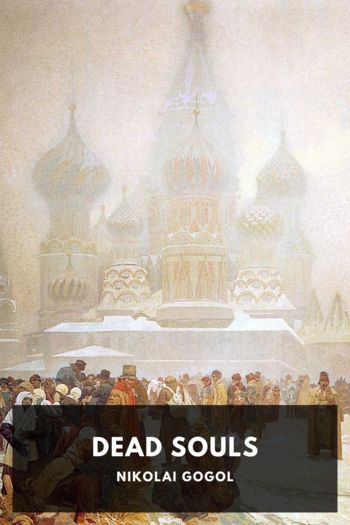Dead Souls - Nikolai Gogol (most life changing books .txt) 📗

- Author: Nikolai Gogol
Book online «Dead Souls - Nikolai Gogol (most life changing books .txt) 📗». Author Nikolai Gogol
“Back out, you rook of Nizhni Novgorod!” the strangers’ coachman shouted. Selifan tightened his reins, and the other driver did the same. The horses stepped back a little, and then came together again—this time getting a leg or two over the traces. In fact, so pleased did the skewbald seem with his new friends that he refused to stir from the melee into which an unforeseen chance had plunged him. Laying his muzzle lovingly upon the neck of one of his recently-acquired acquaintances, he seemed to be whispering something in that acquaintance’s ear—and whispering pretty nonsense, too, to judge from the way in which that confidant kept shaking his ears.
At length peasants from a village which happened to be near the scene of the accident tackled the mess; and since a spectacle of that kind is to the Russian muzhik what a newspaper or a club-meeting is to the German, the vehicles soon became the centre of a crowd, and the village denuded even of its old women and children. The traces were disentangled, and a few slaps on the nose forced the skewbald to draw back a little; after which the teams were straightened out and separated. Nevertheless, either sheer obstinacy or vexation at being parted from their new friends caused the strange team absolutely to refuse to move a leg. Their driver laid the whip about them, but still they stood as though rooted to the spot. At length the participatory efforts of the peasants rose to an unprecedented degree of enthusiasm, and they shouted in an intermittent chorus the advice, “Do you, Andrusha, take the head of the trace horse on the right, while Uncle Mitai mounts the shaft horse. Get up, Uncle Mitai.” Upon that the lean, long, and red-bearded Uncle Mitai mounted the shaft horse; in which position he looked like a village steeple or the winder which is used to raise water from wells. The coachman whipped up his steeds afresh, but nothing came of it, and Uncle Mitai had proved useless. “Hold on, hold on!” shouted the peasants again. “Do you, Uncle Mitai, mount the trace horse, while Uncle Minai mounts the shaft horse.” Whereupon Uncle Minai—a peasant with a pair of broad shoulders, a beard as black as charcoal, and a belly like the huge samovar in which sbiten is brewed for all attending a local market—hastened to seat himself upon the shaft horse, which almost sank to the ground beneath his weight. “Now they will go all right!” the muzhiks exclaimed. “Lay it on hot, lay it on hot! Give that sorrel horse the whip, and make him squirm like a koramora.”22 Nevertheless, the affair in no way progressed; wherefore, seeing that flogging was of no use, Uncles Mitai and Minai both mounted the sorrel, while Andrusha seated himself upon the trace horse. Then the coachman himself lost patience, and sent the two Uncles about their business—and not before it was time, seeing that the horses were steaming in a way that made it clear that, unless they were first winded, they would never reach the next posthouse. So they were given a moment’s rest. That done, they moved off of their own accord!
Throughout, Chichikov had been gazing at the young unknown with great attention, and had even made one or two attempts to enter into conversation with her: but without success. Indeed, when the ladies departed, it was as in a dream that he saw the girl’s comely presence, the delicate features of her face, and the slender outline of her form vanish from his sight; it was as in a dream that once more he saw only the road, the britchka, the three horses, Selifan, and the bare, empty fields. Everywhere in life—yes, even in the plainest, the dingiest ranks of society, as much as in those which are uniformly bright and presentable—a man may happen upon some phenomenon which is so entirely different from those which have hitherto fallen to his lot. Everywhere through the web of sorrow of which our lives are woven there may suddenly break a clear, radiant thread of joy; even as suddenly along the street of some poor, poverty-stricken village which, ordinarily, sees nought but a farm wagon there may came bowling a gorgeous coach with plated harness, picturesque horses, and a glitter of glass, so that the peasants stand gaping, and do not resume their caps until long after the strange equipage has become lost to sight. Thus the golden-haired maiden makes a sudden, unexpected appearance in our story, and as suddenly, as unexpectedly, disappears. Indeed, had it not been that the person concerned was Chichikov, and not some youth of twenty summers—a hussar or a student or, in general, a man standing on the threshold of life—what thoughts would not have sprung to birth, and stirred and spoken, within him; for what a length of time would he not have stood entranced as he stared into the distance and forgot alike his journey, the business still to be done, the possibility of incurring loss through lingering—himself, his vocation, the world, and everything else that the world





Comments (0)